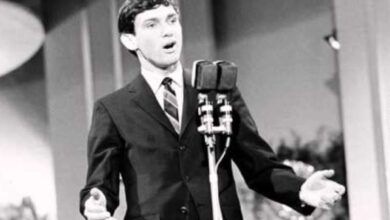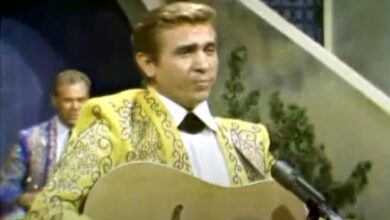Elvis’s Final Show: A Courageous Effort Despite Clear Health Issues
Elvis Presley, an emblematic figure in the history of popular music, is fondly remembered for his unique ability to bridge genres and cultures. Born on January 8, 1935, in Tupelo, Mississippi, Presley grew up in a working-class family, nurturing a passion for music that would ultimately change the world. He was deeply influenced by the diverse musical landscape surrounding him, absorbed by the sounds of gospel music from Black churches, the twang of country music, and the rhythmic beats of blues. This eclectic mix laid the foundation for his revolutionary style that would captivate millions.
His journey to stardom began rather modestly when he recorded his first song at Sun Records in 1953. With his raw, emotive voice and magnetic stage presence, he quickly captured the attention of producers and audiences alike. The release of “Heartbreak Hotel” in 1956 marked his breakout moment; it topped the charts and solidified his status as a household name. The infusion of rhythm and blues into mainstream music, propelled by Presley’s performances, marked a pivotal moment in the evolution of rock and roll, influencing countless artists and shaping the musical landscape of the following decades.
As his fame skyrocketed, so did the socio-cultural impact of his music. Presley’s performances were electrifying and often deemed provocative, challenging the conservative norms of the 1950s. His famous dance moves, particularly the infamous “Elvis pelvis,” drew both admiration and controversy, as critics struggled to digest his fusion of sexual expression and musicality. This dynamic presence on stage, coupled with his striking good looks, made him an object of adoration for fans while simultaneously earning ire from more traditional segments of society. Such duality only heightened his popularity, as he became a symbol of youth and rebellion.
Movies played a crucial role in enhancing Elvis’s fame. Between the late 1950s and early 1960s, he starred in over 30 films, many of which became successful musical ventures, like “Viva Las Vegas” and “G.I. Blues.” These films often showcased his musical talent, allowing him to reach a broader audience beyond his records. While critics often dismissed these films as lowbrow entertainment, they contributed to maintaining his public presence and popularity during a time when his music faced increasing competition from other evolving rock acts. The soundtracks of these movies, filled with catchy tunes, further solidified his legacy and created some of his most memorable hits.
However, the 1960s ushered in both creative reinvention and struggle for the King. After a period fueled by cinematic endeavors, Presley faced challenges as musical styles evolved with the emergence of rock bands and singer-songwriters. Critics began to view him as a relic of an earlier era, and his chart-topping days appeared to wane. Yet, his legendary 1968 “Comeback Special” on NBC breathed new life into his career, showcasing a more mature, self-assured artist. This performance, stripped of the Hollywood glamour that defined his earlier works, highlighted his vocal prowess and genuine connection with audiences, leading to a resurgence in both his music career and public perception.
Presley’s personal life was just as complex as his musical career. His marriage to Priscilla Beaulieu in 1967 was a significant chapter, marked by love and tumult. Their relationship, which began when Priscilla was a teenager, was subjected to intense public scrutiny. Although they had a daughter, Lisa Marie Presley, the couple faced challenges, leading to their divorce in 1973. The end of their marriage, amid various pressures and changes, profoundly impacted his life and artistry, perhaps serving as a source of inspiration during periods of personal reflection in his music.
The toll of fame weighed heavily on Elvis, manifesting in health and personal struggles. By the 1970s, his battles with substance abuse became increasingly pronounced, affecting his performances and overall health. Despite these issues, his musical talent shone through; concerts were often a paradox of brilliance and vulnerability. His resilient spirit kept him performing, and audiences continued to flock to see him, even as concerns arose regarding his well-being.
Tragically, Elvis Presley passed away on August 16, 1977, at the young age of 42, leaving behind a phenomenal legacy. His last public performance in June that year was steeped in emotion, acknowledged by many as a bittersweet farewell to a cultural icon. Fans were left to grapple with the loss of someone who had shaped the very essence of rock music. Following his death, tributes poured in, reflecting on how deeply his music had resonated with generations.
Even in the years since his passing, the influence of Elvis Presley has endured. His recordings continue to receive airplay, and remixes have made his music accessible to new audiences. Several documentaries and films exploring his life have been produced, and tribute acts ensure that his presence remains alive in popular culture. Annual pilgrimages to Graceland, his beloved estate, attract thousands of fans who continue to celebrate his life and legacy, showcasing the deeper connection many feel towards him.
Elvis Presley’s life story serves as a reminder of the complexity of artistry and the challenges that come with fame. He was not merely a performer, but a cultural phenomenon who crossed the boundaries of race, class, and music genres. The tapestry of influences that composed his art — from gospel to blues — rendered him a unique figure whose music shared themes of love, heartache, and longing, ensuring that his impact on music remains profound and far-reaching.
In closing, Elvis Presley’s legacy is intertwined with the evolution of modern music and the cultural zeitgeist of the 20th century. His contributions continue to inspire artists across all genres, and his story reflects the triumphs and tragedies that often accompany a life in the spotlight. The King of Rock and Roll will forever be remembered not only for his incredible voice but also for the emotional depth and cultural significance of his work.



